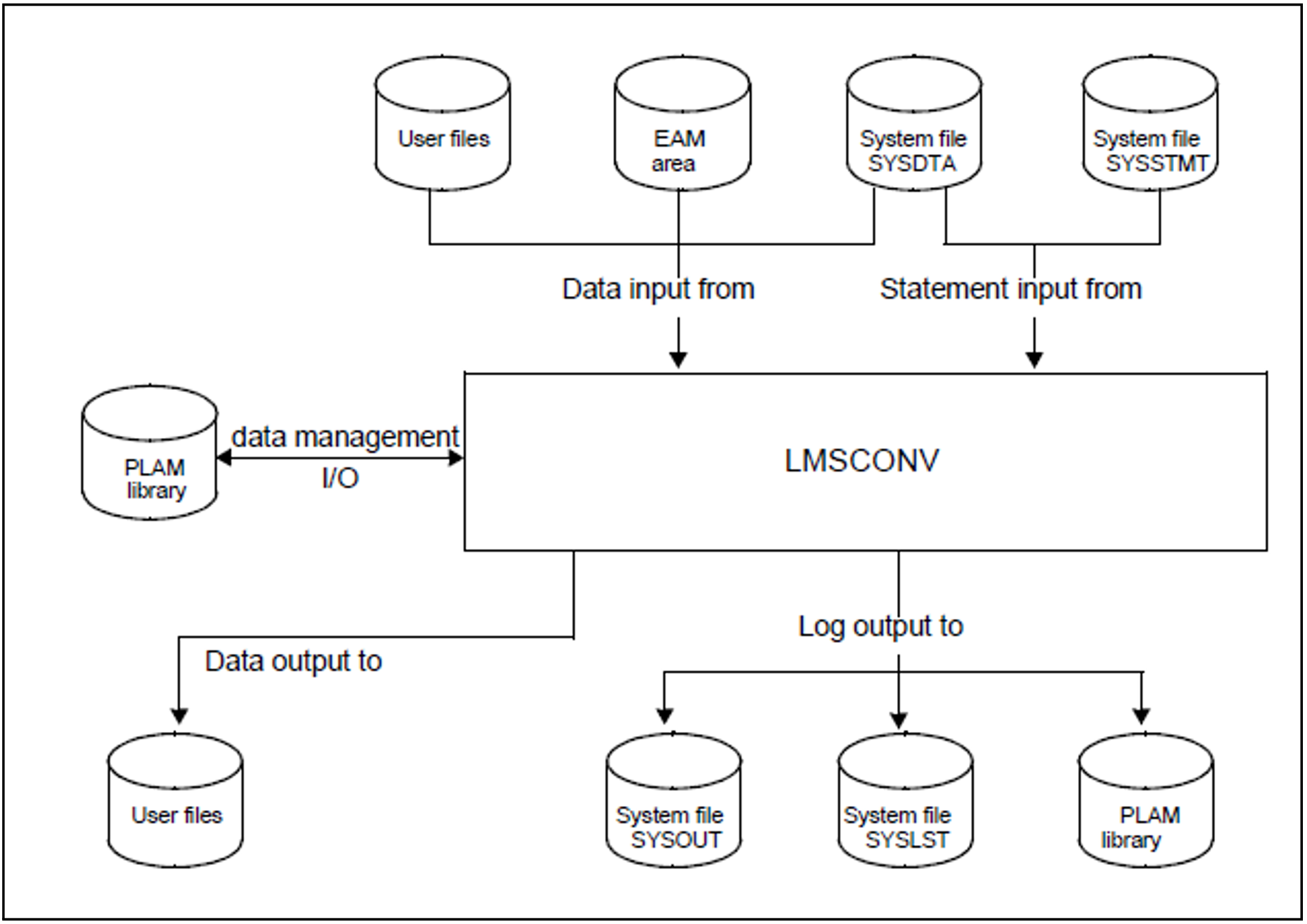Version: | LMSCONV (SDF format) V3.6A |
LMSCONV (Library Maintenance System Converter) is a routine for managing libraries and the members they contain.
LMSCONV performs the following functions:
create libraries
add files as library members
Outputs members in files
copy members to another library
list members
delete members
correct members
Outputting library directories
LMSCONV supports the processing of files > 32 GB (LARGE OBJECTS).
LMSCONV, a variant of the software product LMS with functional restrictions, is provided with both an ISP interface and an SDF interface. LMSCONV (ISP format) remains functionally unaltered as of BS2000/OSD-BC V2.0. This chapter describes the functionality of LMSCONV (SDF format).
LMSCONV (SDF format) is derived from the LMS (SDF format) software product. The functional scope is a subset of LMS (SDF format). A list of restrictions compared to LMS is given on "Comparison between LMSCONV and LMS".
Notes
LMSCONV indicates all attributes for libraries, types and members, i.e. including attributes that can only be modified using LMS.
For the processing of libraries under LMSCONV, all attributes, i.e. not only those that can be influenced directly under LMSCONV, are important. Library processing may therefore only be possible in restricted form (e.g. no read right for a member).
Members of a defined use type can be processed with LMSCONV.
Library lists and type control can be used.
When installing LMSCONV, it is possible to specify the name which individual product files should receive and the ID under which they are to be stored. The complete path name of all product files of LMSCONV can be determined using /SHOW-INSTALLATION-PATH.
Overview of LMSCONV statements
Statement | Remarks |
|---|---|
| Adds files as members |
| Closes libraries |
| Copies members |
| Copies a library |
| Deletes members |
| Terminates the LMSCONV run |
| Outputs members in files |
| Modifies the global default values |
| Modifies members |
| Modifies member attributes |
| Modifies the logging scope |
| Opens a global library |
| Shows the global default values |
| Shows the member contents |
| Shows the member attributes |
| Shows the library attributes |
| Shows the library states |
| Shows the values for the logging scope |
| Shows the type attributes |
| Shows the LMSCONV version |
| Writes a comment in the log |
LMSCONV input and output stream
The following figure shows the input and output options for LMSCONV:
LMSCONV reads all statement inputs via the dialog interface SDF. For detailed information, please refer to the “SDF Dialog Interface” manual [20 (Related publications)].
Example of an LMSCONV run
(IN) start-lmsconv (OUT) % LMC0310 LMSCONV VERSION '<version>' STARTED 1. (IN) modify-logging-parameters logging=*maximum 2. (IN) open-library library=ueb.bib,mode=update 3. (OUT) LIBRARY IS CLEARED AND PREPARED 4. (IN) add-element from-file=test, to-elem=(elem=test.ueb,type=s) 5. (OUT) INPUT FILE (NL) OUTPUT LIBRARY= :1OSN:$USER.UEB.BIB (NL) ADD :1OSN:$USER.TEST AS (S)TEST.UEB/@(0001)/<date> (IN) show-element-attributes 6. (OUT) INPUT LIBRARY= :1OSN:$USER.UEB.BIB (NL) TYP NAME VER (VAR#) DATE (NL) (S) TEST.UEB @ (0001) <date> (NL) 1 (S)-ELEMENT(S) IN THIS TABLE OF CONTENTS 7. (IN) show-element (element=test.ueb, type=s) 8. (OUT) INPUT LIBRARY= :1OSN:$USER.UEB.BIB (NL) INPUT ELEMENT= (S)TEST.UEB/@(0001)/<date> (NL) TESTFILE, CAN BE DELETED AT ANY TIME !! 9. (NL) NUMBER OF PROCESSED RECORDS IS 1 (IN) end 10. (OUT) % LMC0311 LMSCONV VERSION '<version>' TERMINATED NORMALLY
LMSCONV is called.
In addition to error messages, success messages are also logged.
The new global library (i.e. assigned by the OPEN-LIBRARY statement) UEB.BIB is created and assigned as an I/O library.
The UEB.BIB library has been created.
The TEST file is added to the library as member TEST.UEB of type S.
The contents of the library UEB.BIB are to be listed.
Contents entry of the UEB.BIB library.
The TEST.UEB member is to be listed.
Contents of the TEST.UEB member.
LMSCONV is terminated.
LMSCONV in interactive and batch modes
LMSCONV runs in interactive mode and in batch mode.
Interactive mode
Since members can also be selected using wildcards, it is not possible initially to determine which member is currently being processed. For statements which delete or overwrite member data, it is thus possible to proceed “step-by-step”.
For each member, the user is prompted to process or skip the member, or abort the function.
The query mechanism is activated with the operand DIALOG-CONTROL=*YES.
The default value of DIALOG-CONTROL can be modified by the MODIFY-DEFAULTS statement.
The inquiry mechanism can be restricted to error cases by DIALOG-CONTROL = *ERROR. In the following non-recoverable error cases, the inquiry mechanism is activated in interactive mode even if DIALOG-CONTROL = *NO:
when a member cannot be accessed, e.g. because it is locked by another user (temporary exclusive use of a member for modification, for example)
when a library cannot be accessed, e.g. because the current access rights do not permit this (temporary exclusive use of a library).
It is possible to make LMSCONV behave as if it is running in batch mode, which, among others, totally deactivates the inquiry mechanism, by setting RUN-MODE=*BATCH in MODIFY-DEFAULTS statement.
Batch mode
If a library, a member or a type is locked, the user can set the number of new attempts and the time between two attempts using the statement MODIFY-DEFAULTS ..., NEXT-ATTEMPT. By default, no new attempts are made.

